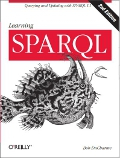For part 3 of my series on semantic web project ideas, I was tempted to take part 2 and do a global replace of "ERP" for "CRM". I'll briefly recap what a semantic web add-on to an open source Enterprise Resource Planning package would have in common with a similar add-on to an open source Customer Relationship Management package:
I didn't know that open source packages for this existed until I read the Tapscott/Williams book.
It's about integration across organization boundaries, so semweb technology should have plenty to offer.
When researching existing open source packages, look for discussion forums of users and developers to:
Get ideas for what semweb technologies can add
Find a user with real data that you can work with (maybe for money!)
Get some idea about how easy or difficult the code is to work with
For the basics of what ERP is about, Wikipedia's Enterprise resource planning page seems like a good overview. It describes ERP as an integration of manufacturing, supply chain, financial, CRM and warehouse management systems. Considering what the "R" in "ERP" stands for, semweb tools for tracking data about resources and finding new connections and relationships between them should have plenty to offer for such systems.
A read-write interface might be too ambitious to start with, but wrapping SPARQL interfaces around a few ERP subsystems would be a great beginning. (Make sure to include a few queries that demonstrate productive tasks that couldn't be done without the SPARQL interface; the interface alone isn't enough. You want people who've never heard of SPARQL to say "I want that! I need that!") There are plenty of open source ERP packages out there—some even linked to CRM products from the same organizations—so there's plenty to work with. One has the intriguing name of Tiny ERP, and its source code is available in two gzipped files: one of client code and one of server code.
Google searches for ERP ontology get a few interesting hits. There's probably nothing ready to use as-is, but they look like a good head start. As with CRM semantic web development, I'd rather see someone combine iterative additions to an ontology with demos of working code than doing lots and lots of ontology work before building something that actually uses the ontology.
In a comment to my posting on the possibilities of adding semantic web features to CRM systems, John Cowan pointed out that most open source CRM systems won't completely let you take their code and run with it, but instead only let you re-use it if you distribute your new version with the original developer's branding. This isn't ideal, but it still offers opportunities—if you can get at the package's source, you can add new features, such as the exposure of the package's data through a SPARQL endpoint. I think it will be worth it, because a successful implementation could demonstrate the value of semweb technology to a lot of people who would really take notice.


Bob.,
I don't know if you are aware of the Linking Open Data project? Anyway, we are using this community to drive through work in this area (note the THALIA integration benchmark effort).
We already have an eCRM system that is part of ODS. The product is currently unreleased becuase we haven't found a shared ontology that models the CRM domain. Anyway, we are not only working on RDF and SPARQL access to our eCRM effort. We are also looking to implement this atop Open Source CRM systems like SugarCRM. The same goals apply to ERP systems (of the Open Source variety).
Kingsley,
Great to hear! And I saw this coming.
Bob